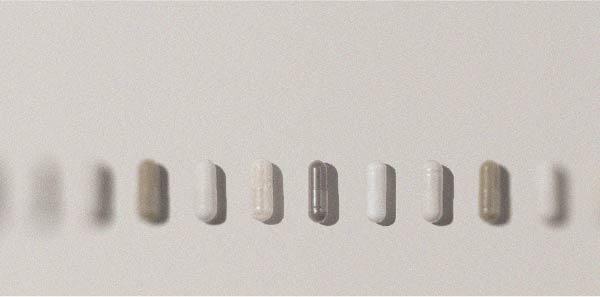Which foods and supplements should be kept in the refrigerator?
Let’s get rid of any misconceptions with a list of foods and dietary supplements that either do or don’t need to be refrigerated.

Which foods should be kept in the fridge and which in the cupboard?
Foods to keep refrigerated
Perhaps it’s obvious but certain foods definitely need to be kept in the fridge (at a temperature normally between 32 and 43°F), and only for a maximum period which depends on the type of food and whether it’s raw or cooked:
- meat;
- fresh fish;
- fresh pasteurised milk.
In addition, foods which aren’t preserved in anything should be kept in the fridge after opening: pasteurised long-life milk, canned food once opened, fruit juices, soups, prepared vegetables, etc.
With regard to eggs, which are admittedly not kept in the chiller cabinet in some European supermarkets, the Food and Drug Administration (FDA), supported by the recommendations of the Centers for Disease Control and Prevention (CDC), has decided the issue: for commercialized eggs, it is imperative to keep them refrigerated. Non-pasteurised cartons of eggs must bear a message such as « Keep eggs refrigerated » to reduce the increased risk of infection by Salmonella.
As for butter and cheese, it comes down to personal taste, preference and habit, as well as external temperature: for optimal preservation, especially in summer, it’s best to keep them refrigerated. In winter, butter and cheese can be kept at room temperature in a suitable container (butter dish, cheese preserver).
Foods that shouldn’t go in the fridge
Conversely, certain foods will lose their flavor, texture or nutritional qualities if kept in the fridge:
- potatoes;
- tomatoes;
- garlic;
- avocados;
- chocolate;
- melon and watermelon;
- cucumber;
- basil;
- bread.
And some foods and condiments which are commonly kept in the fridge can definitely be stored in the cupboard:
- jam and marmalade, even once opened;
- pickles;
- mustard (it’s stronger in the fridge and milder at room temperature – the crust it forms is not a health risk);
- ground coffee;
- etc.
Dietary supplements: which ones should be refrigerated?
Most dietary supplements are dry products!
Generally speaking, supplements do not need to be kept in the fridge. They are produced from dry extracts and/or oils, which means they have no special storage requirements.
The only recommendation is to keep them in a cool, dry place, away from light to prevent any deterioration in quality.
The nature of some supplements, however, (live organisms in particular), means they keep better and longer when refrigerated.
For probiotics, always opt for the fridge
Like the baker’s yeast you buy in sachets, probiotics are live microorganisms that have been ‘deactivated’ by a process of dehydration. But in this form, probiotics and yeasts can be subject to significant oxidative stress (1).
To reduce this risk, probiotics may be packaged in hermetic blister packs to protect them from oxygen. Compounds such as sorbitol and inulin may also be added to the probiotic formulation for enhanced preservation (2).
Finally, they should ideally be stored in refrigerated conditions prior to dispatch (as SuperSmart does for those probiotics that need it) as well as once they reach you.
In terms of our product range, refrigeration is particularly recommended for the following probiotics:
- Probio Forte (delayed release capsules delayed release, minimal humidity, inulin, airtight blister pack, freeze-dried, refrigerated storage prior to dispatch);
- Candalb (delayed release capsules delayed-release, minimal humidity, inulin, airtight pot, freeze-dried, refrigerated storage prior to dispatch);
- Oral Health (individual sticks, sorbitol, freeze-dried, airtight packaging, refrigerated storage prior to dispatch);
- Lactobacillus reuteri (delayed release capsules delayed-release, minimal humidity, airtight pot, freeze-dried, refrigerated storage prior to dispatch).
Is it best to keep DIM supplements cold?
A molecule produced when the body digests cruciferous vegetables, Di-indolyl methane (DIM) is a natural metabolite also subject to oxidative stress and should thus be stored at a temperature of between 36 and 46°F (3).
So make sure you refrigerate any supplements that contain DIM, such as Natural Anti Aromatase Support, an enhanced formulation for combatting excess estrogen production, containing a synergistic combination of DIM, chrysin, extracts of agaricus, naringin, genistein, etc.
Note: it’s completely normal for DIM to turn pink over time – this does not affect its benefits.
Enzymes and refrigeration: a case-by-case approach
Enzymes are proteins which serve as catalysts of certain chemical reactions in the body.
Whether acting as digestive enzymes (which play a role in the digestion of macronutrients and micronutrients) or as metabolic enzymes (which regulate metabolic pathways), the kinetics of thermal denaturation of many enzymes can be significant (from a few hours’ to a few days’ half-life) – even at moderate temperatures such as 68°F.
It’s therefore advisable to keep enzymatic preparations in the fridge (at a temperature of around 37° to 39°F) which will usually ensure stability for several months.
This is the case, for example, with the following supplements:
- Catalase 12,500: a natural metabolic enzyme, production of which declines with age, catalase 12,500 maintains hair pigment, thus delaying the appearance of grey hair (4);
- Pancreatin: pancreatic juice contains three types of digestive enzyme: trypsin, chymotrypsin and pancreatin, which are involved in the digestion of proteins and fatty acids (5);
- NADH: nicotinamide adenine dinucleotide is an important cofactor of a number of the body’s enzymatic reactions. It is involved in particular in the production of the precursor of the happiness hormone (6).
References
- RASCÓN, M. P., HUERTA-VERA, K., PASCUAL-PINEDA, L. A., et al.Osmotic dehydration assisted impregnation of Lactobacillus rhamnosus in banana and effect of water activity on the storage stability of probiotic in the freeze-dried product. Lwt, 2018, vol. 92, p. 490-496.
- MIREMADI, Fatemeh et SHAH, Nagendra P. Applications of inulin and probiotics in health and nutrition.
- KAMAL, A. et QURESHI, A. Ali. Syntheses of some substituted di-indolylmethanes in aqueous medium at room temperature. Tetrahedron, 1963, vol. 19, no 4, p. 513-520.
- CLAIBORNE, A. L. Catalase 12,500 activity. In : CRC handbook of methods for oxygen radical research. CRC press, 2018. p. 283-284.
- AKESON, Walter R. et STAHMANN, Mark A. A pepsin pancreatin digest index of protein quality evaluation. The Journal of nutrition, 1964, vol. 83, no 3, p. 257-261.
- WU, Hong, TIAN, Chunyong, SONG, Xiaokai, et al.Methods for the regeneration of nicotinamide coenzymes. Green Chemistry, 2013, vol. 15, no 7, p. 1773-1789.
Keywords
2 Days
great products and prices
great products and prices
Marie
7 Days
Easy to navigate site
Easy to navigate site, had what I was searching for, good price. easy order-check out
James Tucker
14 Days
My skin is clearing up nicely!
Pretty good for my skin so far.
Christian
16 Days
The new packaging is excellent
The new packaging is excellent - finally! No more squashed boxes and torn envelopes.
GORAN
17 Days
Great Product
Great Product
Larry Garrett
21 Days
Quick shipping
Quick shipping; good price. No issues!
Mary McCarty
22 Days
Thr product is very good and is helping…
Thr product is very good and is helping me on my health. Then is always on time
LUGO Luz
25 Days
Buying was fine
Buying was fine. I had problems with the website not recognizing my login info, and had to call to get it fixed. Other than that, everything was good.
David S. Clark
25 Days
Your super maca and super ginseng are…phenomenal
Your super maca and super ginseng are phenomenal supplements that compliment each other when taking them together. Fantastic feeling of well-being and lots of mid day energy without the crash.
Keith Mason
28 Days
I have had amazing results with every…
I have had amazing results with every supplement I've purchased. I am extremely satisfied with this company
kirstin Torres
28 Days
Fine products
Fine products . They are on the leading edge of online supplements. The only issue -so far-is they sometime run out of subscription items.
Jason Argos
31 Days
The ordering process is very user…
The ordering process is very user friendly and the products always come in a timely manner.
CARTER Rhonda
32 Days
The price for Dr
The price for Dr. Pero's AC-11 is reasonable and in line with his views. (my former colleague). Keep it pure.
CAMPBELL Clayton
35 Days
Right on every time.
Right on every time.
Arthur Nicholas
37 Days
They are cheaper than everyone else and…
They are cheaper than everyone else and the shipping was fast. Great company.
Patricia Adams




